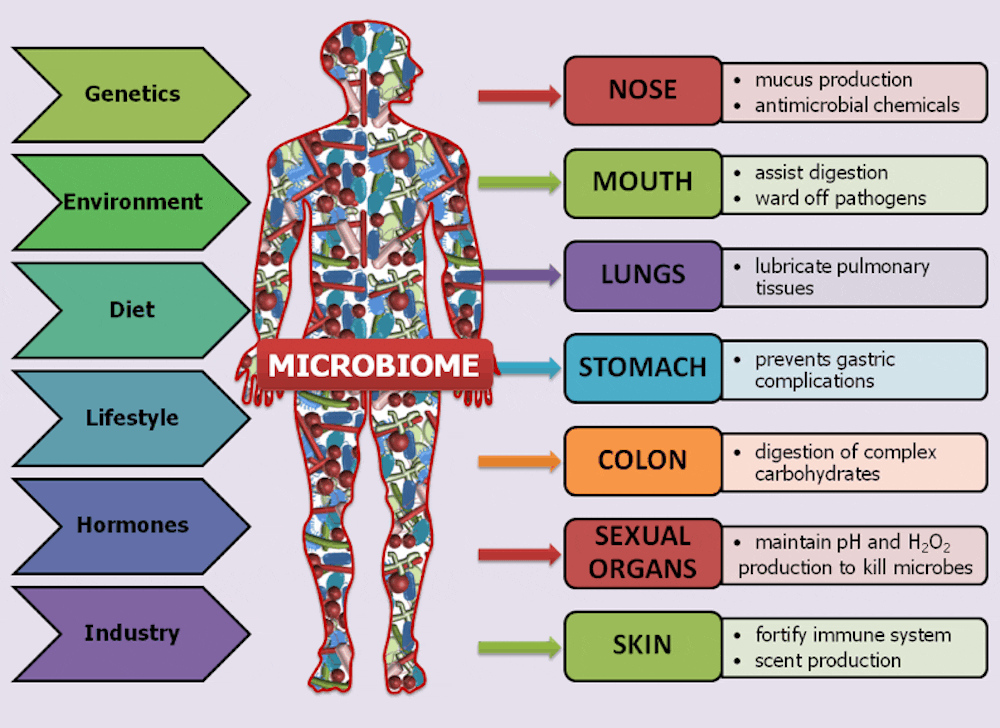The Human Microbiome Project (HMP) is an interdisciplinary research effort at the National Institutes of Health that aims to characterize the microbial communities found at several different sites on the human body, including nasal passages, oral cavities, skin, gastrointestinal tract, and the urogenital tract, and analyze the role of these microbes in human health and disease.
In a series of coordinated scientific reports published on June 14, 2012, in Nature and several journals in the Public Library of Science (PLoS), some 200 members of the Human Microbiome Project (HMP) Consortium from nearly 80 universities and scientific institutions report on five years of research.
Press Materials
Related Press Releases
- NHGRI Press Release: NIH Human Microbiome Project defines normal bacteria makeup of the body
 Telebriefing Audio [MP3 - 13 MB]
Telebriefing Audio [MP3 - 13 MB]- Telebriefing Transcript

- Telebriefing Participant Bios
- Twitter Feed: #microbiome
- MLB Woods Hole: "More than One Way to Be Healthy": First Map of the Bacterial Makeup of Humans Relies on MBL Innovations, Insights
- UNC Charlotte: Human Microbiome Project Researchers Find Vast Individual Differences in Our Bacteria
- Washington University in St. Louis: Census of microbes in healthy humans reported
Human Microbiome Project (HMP) Published Papers
A series of coordinated scientific reports published on June 13, 2012, in Nature and several journals in the Public Library of Science (PLOS)
Nature Papers
- Structure, function and diversity of the healthy human microbiome

- A framework for human microbiome research

Public Library of Science (PLOS) Papers
- A Metagenomic Approach to Characterization of the Vaginal Microbiome Signature in Pregnancy
- Complex Carbohydrate Utilization by the Healthy Human Microbiome
- A case study for large-scale human microbiome analysis using JCVI's Metagenomics Reports (METAREP)
- A Core Human Microbiome as Viewed Through 16S rRNA Sequence Clusters
- Host genes related to Paneth cells and xenobiotic metabolism are associated with shifts in human ileum-associated microbial composition
- Inflammatory bowel diseases phenotype, C. difficile and NOD2 genotype are associated with shifts in human ileum associated microbial composition
- Analyses of the Microbial Diversity across the Human Microbiome
- Optimizing Read Mapping to Reference Genomes to Determine Composition and Species Prevalence in Microbial Communities
- Novel Bacterial Taxa in the Human Microbiome
- Evaluation of 16S rDNAbased community profiling for human microbiome research
- Sequence Analysis of the Human Virome in Febrile and Afebrile Children
- Metabolic reconstruction for metagenomic data and its application to the human microbiome
- Diverse CRISPRs evolving in human microbiomes
- Reducing the effects of PCR amplification and sequencing artifacts on 16S rRNA-based studies
Human Microbiome Project (HMP) Resources
- Human Microbiome Project
On the National Institutes of Health Common Fund website - Human Microbiome Project: The Broad Institute
The Broad Institute's goals in the HMP were to: generate a comprehensive set of 1,000 reference genomes from organisms comprising the human microbiome; determine whether individuals share a core human microbiome; understand whether changes in the human microbiome can be correlated with changes in human health; and develop new technologies and bioinformatics tools necessary to achieve these goals. - Human Microbiome Project: Baylor College of Medicine
Baylor College of Medicine joined the Genome Sequencing Center at Washington University, the Broad Institute of MIT and Harvard and the J. Craig Venter Institute to address some early goals of this project. The HMP will rely on metagenomic sample sequencing as a key method for comparisons of microbial communities between individuals, sites, and states (e.g., disease, diet, age). Pilot projects will determine the appropriate sequencing platforms, quality controls, and annotation pipelines for (1) generating reference genomes and (2) sequencing metagenomic samples. - Human Microbiome Project: The Genome Institute at Washington University School of Medicine in St. Louis
The Genome Institute is applying next-generation sequencing technology to analyze human metagenomic samples and the genomes of microorganisms that colonize the human body. A number of projects describing the microbiomes from healthy subjects serve to provide baseline information about the role of bacteria, viruses, and eukaryotic microbes in the body. Other projects characterizing the communities they form in a number of diseases ultimately seek to provide doctors with new diagnostic and therapeutic approaches. - Human Microbiome Project Data Analysis and Coordination Center (DACC)
The central repository for all HMP data. - International Human Microbiome Project Consortium
Aims to study and understand the role of the human microbiome in the maintenance of health and causation of disease and to use that knowledge to improve the ability to prevent and treat disease. - Human Microbiome Project: The J. Craig Venter Institute
J. Craig Venter Institute (JCVI) is helping generate a microbial genome reference set of at least 1000 genomes and conduct metagenomic studies to characterize the microbial communities from multiple body sites. - The Human Microbiome Project: Facebook

No comments:
Post a Comment